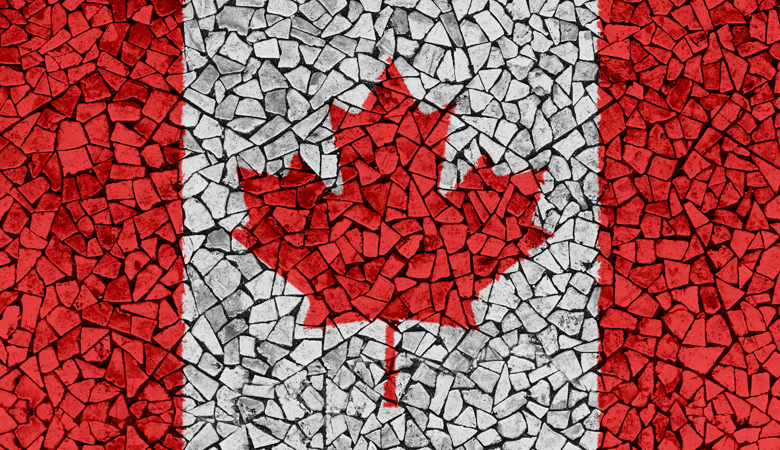My best friend and I share a lot of things in common. We went to the same high school, we both love superhero movies, we are both writers and we were both born in Canada. But despite both of us bleeding red and white, she is regularly asked, “Where are you from?” As a white man born and raised in Canada, with no discernible accent, my Canadian-ness is seemingly apparent. The fact that her ancestors are from India and she has brown skin has made many people call her Canadian identity into question.
Part of the problem is that we often define what it means to be Canadian with whiteness. Ever since the colonization of Canada, primarily by English and French people, Canada has been viewed either explicitly or implicitly as a country built by white men, for white men, while ignoring Indigenous history. European values, traits and cultures were imported, and everything else was foreign. In the early 1970s, there was a push to define Canada as a mosaic, not a melting pot, of cultures.
A mosaic, as I understand, recognizes that different people from different places bring their own food, clothes, language, art and culture, adding to the richness of Canadian society. A melting pot, on the other hand, means that you are expected to toss your culture into a cauldron, where it is mixed with everyone else’s culture, and only the aspects that prove popular are kept. “Some foods can stay, but nothing too spicy or ‘weird.’ ” “I love this pattern, but the rest of the outfit looks silly.” “I know you were taught English in your country, but you need to speak it like we speak it.”
In 1971, Prime Minister Pierre Trudeau introduced a policy of multiculturalism, acknowledging that Canadians come from a variety of cultural backgrounds, and that every culture has intrinsic value. In his book, Memoirs, he wrote, Canadian society is “where all people are equal and where they share some fundamental values based on freedom.” There are those who oppose this vision of multiculturalism and think things should remain as they were. As both a patriot and a Christian, I refuse to engage in a debate with those who would call the identity and worth of other human beings into question.
You are not Canadian because of, or in spite of, your British, Indian or Chinese heritage; you are Canadian because you believe in the freedom your national identity gives you. It’s not “either/or,” it’s “both/and.” Celebrate your Canadianness and any other identities you hold. Just because someone is Indian-Canadian or Jamaican-Canadian does not make them any less Canadian.
My second question, about national pride, is even harder to answer. From residential schools, to the treatment of Chinese workers building the Canadian Pacific Railway, to the internment of Japanese Canadians during the Second World War, Canada has not always been on the right side of history. If we celebrate Canada, are we whitewashing past or current problems?
In my view, it comes down to making people fans of Canada without becoming a fanatic. A fan enjoys something, while aware of its flaws; a fanatic refuses to recognize there are any flaws. A fan of Canada can enjoy it on its own merit, while a fanatic insists on putting every other country down. A fan has multiple identities, some overlapping and some not, while a fanatic only has one identity.
I can acknowledge our problematic past and current issues and still celebrate Canada Day and my Canadian identity. If you can’t, that’s OK. We don’t all have to be Canadian in the same way to show we are patriots.
I am a proud Canadian, but I also believe that my “citizenship is in heaven” (Philippians 3:20). Some of the best qualities ascribed to being Canadian—freedom, compassion, generosity—are, in fact, what God calls all Christians to practise and preach. This does not mean we look for other Christian virtues to set us apart from the world, but rather, we go beyond what an average Canadian would be willing to do. I have no doubt that if Christ witnesses us fighting for justice, being exceedingly generous and helping a broken world with a compassionate heart, he will be overjoyed that we are representing his kingdom.
Darryn Oldford is a senior soldier in Toronto.
Illustration: cbies/iStock via Getty Images Plus










I would suggest, however, that there are aspects of multiculturalism that have, over time, served to not strengthen the Canadian fabric but rather weaken in. Or at least inhibit its growth. I personally take no issue with those who wish to celebrate or maintain their unique culture when they come to Canada. But the byproduct of this can be a blunted development of ones new identity. When you chose to live here (or are, heaven forbid, born here) you are no longer Indian or Chinese or Filipino or Italian. You are Canadian, with all that that means. Say what you want about the United States, and I know it is multifactorial, but one of the reasons for America's greatness and overwhelmingly positive world wide influence over the last two plus centuries has been as a result of people thinking themselves first and foremost as American, not Chinese (or whatever) living in Canada.